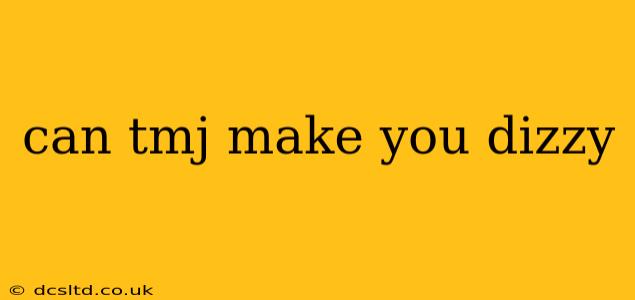Temporomandibular joint (TMJ) disorders can be incredibly disruptive, impacting not only your jaw but potentially causing a range of seemingly unrelated symptoms. One such symptom that often leaves sufferers perplexed is dizziness. While not a direct, always-present effect, dizziness can indeed be linked to TMJ dysfunction. This article explores the potential connection, offering insights into why this occurs and what you can do if you're experiencing both TMJ pain and dizziness.
How Can TMJ Cause Dizziness?
The connection between TMJ and dizziness isn't always straightforward, and it's crucial to understand that dizziness isn't a direct consequence of jaw problems. Instead, the link is often indirect, stemming from the intricate network of nerves and structures in the head and neck.
Here are some key mechanisms that explain how TMJ problems can contribute to dizziness:
-
Cranial Nerve Involvement: The temporomandibular joint is closely associated with several cranial nerves, which are responsible for a variety of functions including balance, eye movement, and sensation in the face and head. TMJ dysfunction can irritate or compress these nerves, leading to dizziness, vertigo (a spinning sensation), or imbalance. The trigeminal nerve, in particular, is frequently implicated.
-
Neck Muscle Strain: Chronic TMJ pain often leads to compensatory postures, such as clenching the jaw or tilting the head to alleviate pain. These postures strain the neck muscles, which are intimately connected to balance and spatial orientation. This muscle strain can then contribute to dizziness or lightheadedness.
-
Postural Issues: Prolonged poor posture due to TMJ pain can disrupt the body's proprioception – its sense of body position and movement. This disrupted sense of body awareness can manifest as dizziness.
-
Inner Ear Issues: While not directly caused by TMJ, chronic stress and tension associated with TMJ can exacerbate pre-existing inner ear conditions, potentially worsening dizziness.
What Other Symptoms Might I Experience with TMJ?
TMJ disorders present a spectrum of symptoms. While dizziness is one possibility, other common signs include:
- Jaw Pain: This is the most prevalent symptom, often felt in the jaw joints, muscles, or surrounding areas.
- Headaches: TMJ problems are frequently linked to headaches, particularly tension headaches and migraines.
- Earaches: Pain or discomfort in the ears can be associated with TMJ dysfunction.
- Clicking or Popping in the Jaw: This is a common sound associated with TMJ disorders.
- Limited Jaw Movement: Difficulty opening or closing the mouth fully.
- Facial Pain: Pain can extend beyond the jaw to the face and temples.
Can TMJ Dizziness Be Serious?
While often not a serious condition in itself, TMJ-related dizziness highlights an underlying issue that needs attention. It's crucial to consult a healthcare professional to determine the cause of your dizziness and to rule out other potential underlying conditions. Ignoring the underlying TMJ problem can lead to chronic pain and other complications.
How is TMJ Dizziness Diagnosed?
Diagnosis typically involves a thorough examination by a dentist or other healthcare provider specializing in TMJ disorders. This examination might include:
- Physical Examination: Checking your jaw's range of motion, palpation of jaw muscles and joints.
- Imaging Tests: X-rays, CT scans, or MRI scans might be used to visualize the TMJ structure.
- Assessment of Symptoms: A detailed discussion of your symptoms, including the nature and frequency of your dizziness.
What Treatments Are Available for TMJ Dizziness?
Treatment focuses on managing the underlying TMJ disorder, which should then alleviate dizziness. Treatment options may include:
- Lifestyle Changes: Improving posture, stress management techniques, and changes to diet (avoiding hard foods).
- Medications: Pain relievers, muscle relaxants, or anti-inflammatory drugs might be prescribed.
- Physical Therapy: Exercises designed to strengthen jaw muscles and improve range of motion.
- Splints or Mouthguards: These devices can help to realign the jaw and reduce muscle strain.
- Injections: Corticosteroid injections can reduce inflammation in the TMJ.
- Surgery: In rare cases, surgery may be necessary.
When Should I See a Doctor About TMJ and Dizziness?
If you're experiencing dizziness alongside jaw pain, clicking, or limited jaw movement, it's important to consult a healthcare professional. Early diagnosis and treatment can significantly improve your outcomes and prevent the condition from worsening. Don't hesitate to seek help if your dizziness is severe, persistent, or accompanied by other concerning symptoms.
Disclaimer: This information is for educational purposes only and does not constitute medical advice. Always consult with a qualified healthcare professional for diagnosis and treatment of any medical condition.
